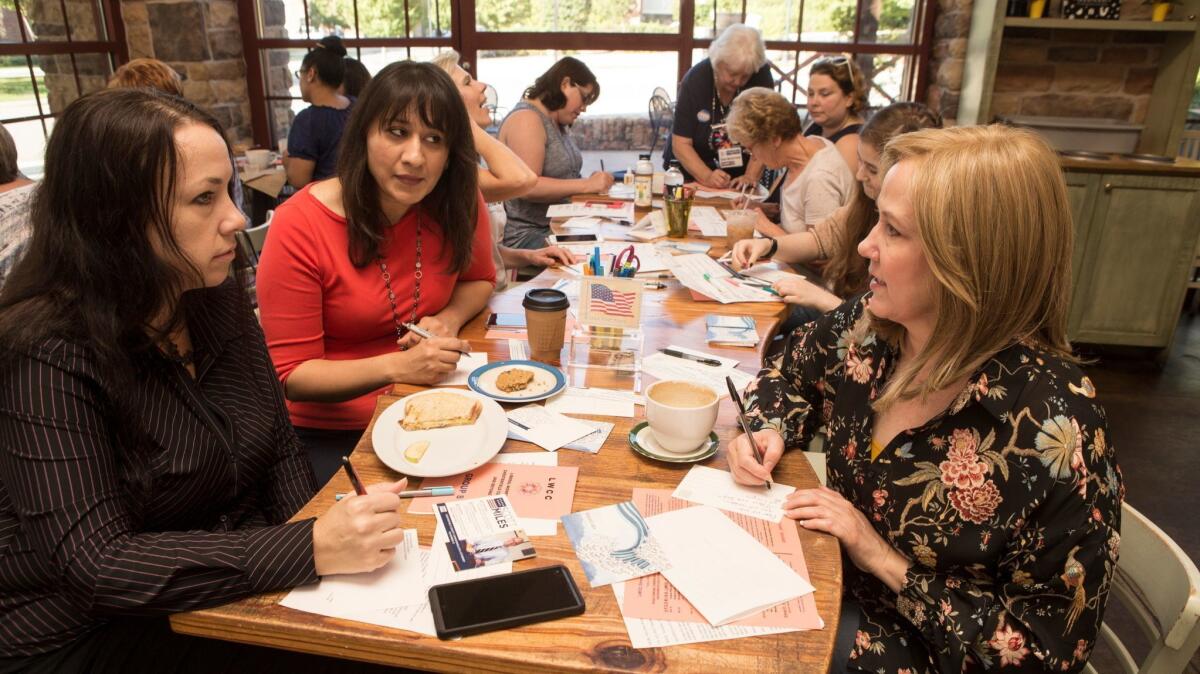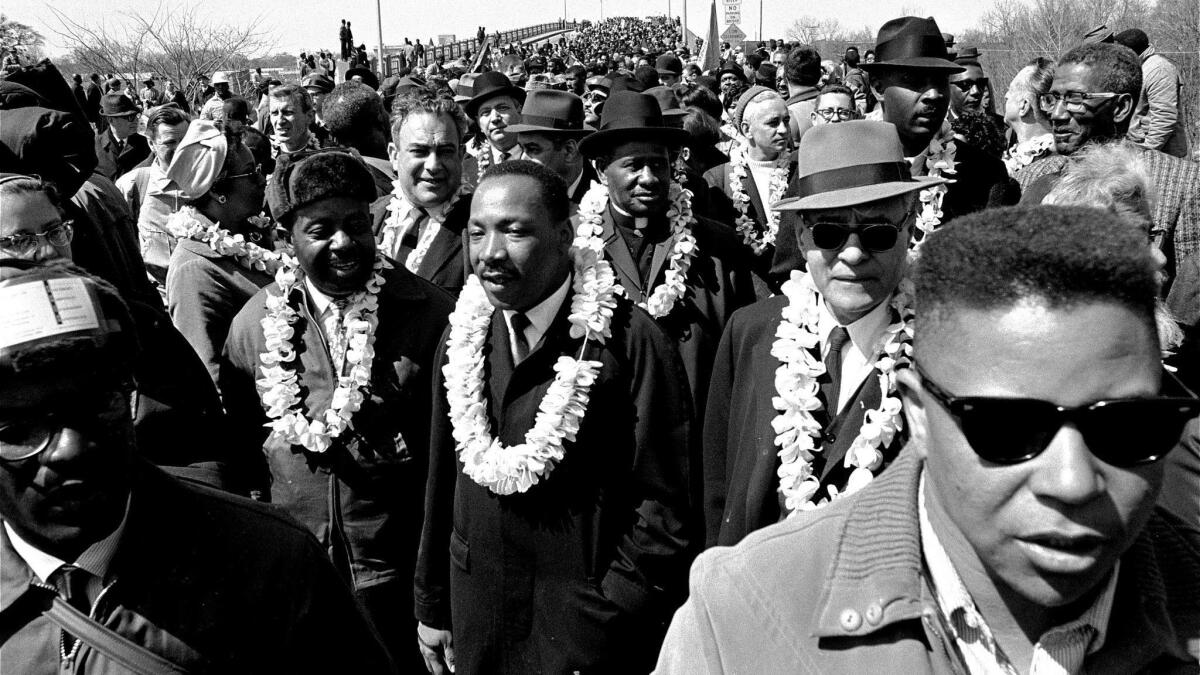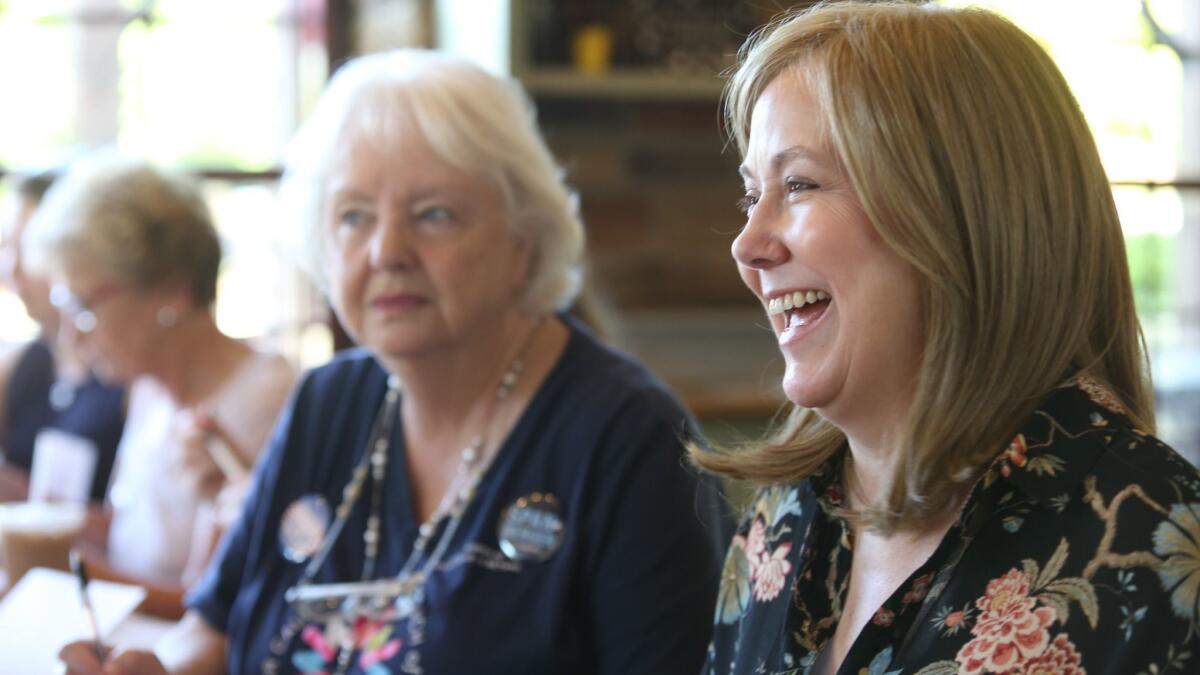Cultural Divide: Books, poems and the Doors inspire liberal women in Virginia against Trump and conservatives

- Share via
Reporting from North Chesterfield, Va. — Along a wooded road, where a school bus had finished its morning run and the mailman was hours away, Kim Drew Wright sat at a dining room table cluttered with poems and short stories that have stoked her political activism and led her to a pivotal battleground in the nation’s culture wars.
She scanned a verse about the burdens of girlhood by Jamaica Kincaid. She turned to a tale of sex abuse, then to another about an Afghan poet who set herself on fire when men scorned her words. Each line, each twist of phrase has made Wright, whose short story collection is titled “The Strangeness of Men,” watchful of unsettling forces: “You know,” she said, “neo-Nazis marched an hour up the road in Charlottesville.”
Other activists in the Liberal Women of Chesterfield County arrived at Wright’s house bearing pumpkin bread, sandwiches and testaments to the songs, books, films and Twitter feeds that have sharpened their politics as much as marches for civil rights and affordable healthcare. Part of a suburban backlash against President Trump, the group is working to upend decades of Republican control of Virginia’s bellwether 7th Congressional District in next month’s midterm elections.
“It’s a very dangerous time,” said Wright, whose cultural allusions are many. “We’re all trapped in a badly written dystopian novel. Trump is either a character right out of George Orwell’s ‘1984’ or a ‘Saturday Night Live’ joke that doesn’t need rewriting. Who can you trust anymore? Bill Cosby, gone. Matt Lauer, gone. Even Ernest Hemingway would be crucified as a misogynist today. It’s all happening when every news channel is someone’s opinion, either left or right.”
Like our politics, we’ve become tribal in what we watch and read. Radio was once America’s singular living room. Then TV, with its handful of networks, honed a common-ground glimpse of the world. But today’s vast expanse of streaming platforms, podcasts and YouTube channels have allowed us to refine and select to a degree that often we don’t encounter ideas, art or anything else that might heighten our understanding beyond our red state/blue state prejudices and conformities.
America, clamorous and unruly, is riven by anger and alienating narratives, as if a sprawling novel teeming with scurrilous characters navigating intrigue, bitterness and recrimination. Passions at the ballot box and over Brett Kavanaugh’s Supreme Court appointment are rooted in deeper predilections driven in part by artistic and cultural touchstones that awaken and define us, from “The Great Gatsby” to Beyoncé’s “Lemonade,” from “Crazy Rich Asians” to the statues of Confederate heroes that still gaze over Monument Avenue in nearby Richmond, the state’s capital.
Popular culture and literature offer vivid and, at times, ludicrous metaphors in the “post-truth,” alternate-fact universe that has infected our politics. “The Handmaid’s Tale” and “The Man in the High Castle” speak to dark visions of religious zealotry and fascism. Documentary films by Michael Moore are the counterpoint to the books of conservative Ann Coulter.

Becky Stuart Conner, who wears black and a peace sign tattoo on her forearm, is looking for unity in a district of division. She was inspired as a teenager by Jim Morrison and the Doors: “The depth of feeling in his lyrics spoke to me and helped me discover how deep I really could think,” she said. “My parents were Republican and listened to country and bluegrass. I didn’t even realize I was a Democrat until I was 24. The Doors and other music shaped my personality, and I realized everyone has a story and not everyone grew up as privileged as I did.”
The Liberal Women of Chesterfield County (LWCC) — or soccer-mom loonies, according to conservatives — was founded by Wright in 2016 shortly after Donald Trump’s election prompted her to write a Facebook post seeking a community of liberal-minded women. Ninety people showed up at the Capital Ale House for the first meeting. It marked for Wright a moment of collective fury that would later see the rise of #MeToo and other female movements. The group is now backing Abigail Spanberger, a former CIA operations officer, against Rep. Dave Brat, a tea party favorite who shocked the Republican establishment when he defeated House Majority Leader Eric Cantor in the 2014 primary.
With more than 3,600 members and volunteers who have knocked on tens of thousands of doors, the group last year helped the county support a Democrat for governor, the first time since 1961. The 7th Congressional District, population 790,000, is about 70% white, but the black and Latino populations have grown in recent years. The median household income is $77,533, and 40% of adults have a bachelor’s degree or higher.
The LWCC’s influence is a reflection of the cultural shifts and changing demographics in the Richmond suburbs. It also marks a mobilization by women across the country at a time when a record number of women are running for Congress. Brat, who at town hall meetings was chastised over Trump’s healthcare and immigration policies, complained to conservative backers: “The women are in my grill no matter where I go.” In many polls, the race between him and Spanberger is too close to call.
Stretching from north of Charlottesville to southwest of Richmond, the 7th Congressional District is swaths of farmland, folklore, affluent suburbs, echoes of the Civil War and ghosts of the gentry. It is, like much of America, uneasy, a district where outrage over Trump and calls to tear down Confederate monuments is threatening the grip of conservatives, who are hearing from women such as Sidra Butt, a dentist who can cite the Koran and recently finished Bryan Stevenson’s “Just Mercy,” a memoir of racism in the South.
“I Twitter everything to see what’s out there. I follow Trump and Trump Jr.,” said Butt, who has Pakistani ancestry. She was raised in Canada and moved with her husband, a doctor, to the U.S. nearly 20 years ago. “I’m a woman and a minority. Since Trump was elected, I get stopped at the border. I was never stopped at the border before. They keep me four hours each time. It’s a way to intimidate you.”
Those moments made it easy for Butt to identify with Stevenson’s “Just Mercy,” which focuses on the judicial system’s discrimination against minorities and the poor. Butt also relates to the TV show “black-ish” for its depiction of the struggles of retaining one’s cultural identity. And she was moved by “The Immortal Life of Henrietta Lacks,” the story of ethical questions raised over the harvesting for research of a black woman’s cancer cells without her permission in the 1950s.
“They took her genes for research and never asked her permission. They used her,” Butt said of Lacks. “As a Muslim American woman, I want my voice heard. I would like people to meet me. What you see on TV is not a Muslim woman. I’m not some terrifying creature.” She added that before Trump’s election she hadn’t paid attention to the state’s Civil War monuments and iconography: “But these things celebrate people who lost a war. It’s surreal. Do we really want to honor that?”
Rain fell and the Kavanaugh hearings played in the living room as Butt, Conner and Wright discussed how to get the vote out in November. The neighborhood of Colonial-style houses and basketball hoops in driveways was quiet, tucked away, not far from Falling Creek and bygone farmlands of settlers who arrived in the 1600s and pushed north from Jamestown. Larry Barnett, who plays guitar at LWCC events and is running for a state delegate seat, arrived as Christine Blasey Ford was testifying that Kavanaugh had sexually assaulted her.
“I grew up in the antiwar atmosphere of the ’60s,” said Barnett, recalling when priests stood up in churches in Northern Virginia, home to the military establishment, and denounced the Vietnam conflict. “The Beatles lit a fire, politically and socially. My eighth grade teacher Mrs. Forman set up a music club and taught us about Bob Dylan and Peter, Paul and Mary. Joni Mitchell had a huge influence on me. She was the poet of our time. Bruce Hornsby’s ‘The Way It Is’ is about how far we’re behind on civil rights.”

Conner mentioned that when she was a high school senior she wrote a thesis comparing the Doors’ song “The End” with the Greek tragedy “Oedipus Rex.” She studied Morrison’s poetry and music, and over the years a political philosophy developed that led her into protests against the Iraq War and more recently against Trump and Brat. She has also become a fan of Maynard James Keenan — his name is on her vanity license plate — and his bands Tool and A Perfect Circle.
“I love his song ‘Counting Bodies Like Sheep to the Rhythm of the War Drums,’” said Conner, an electrical designer and a descendant of Jeb Stuart, a Confederate general. “In activism you have to come up with creative ways or your voice gets lost. You have to listen to the stories of other people too. What is the story that has led Republicans to this place?”

The women are in my grill no matter where I go.
— U.S. Rep. Dave Brat
Wright turned to a poem she wrote called “Punch Drunk.” It’s about a suburban woman imagining drinking martinis and being served “sugar-rimmed Lemon Kisses” while thoughts of girls in Africa kidnapped by the extremist group Boko Haram run through her head. She wrote another poem about a tormented poet in Afghanistan whose family tore up her verse. Those far-away women and girls, she said, became more resonant to her after Trump was elected.
“You think things are distant and don’t happen here,” she said, “but then you think, ‘Oh, it’s in my backyard.’ ”
She thumbed through more verse. A ball cap held a blond wig on her head; her T-shirt read: “Straight Outta Chemo.” Wright has breast cancer. When her hair started falling out, she shaved her head on Facebook. She was more concerned at the moment, though, with the upcoming midterms. She is known around the neighborhood as the woman who in the hours after Trump was elected reached for a Sharpie and planted a sign on her lawn: “Trump is a ...”
“There was a need in me to speak out prior to Trump,” she said. “But once Trump was elected it set off a whole new light. I said we have to do something. I’ve learned that you need to be super-, hyper-focused locally. School boards. Local governments. But then you have to be connected across the world.”
Wright read Judy Blume books as a girl and romance novels as a young woman. After her first child was born in 2000, she said she wrote “a horrible 100,000-word novel.” She later shifted to writing short stories and poems, including recently one about Heather Heyer, who was killed in 2017 in Charlottesville when a car raced into a crowd of protesters denouncing a white nationalist rally. Another of her poems, “Ironic Iconic Liberty,” slips into the mind of the Statue of Liberty:
“I’m the mother of exiles / liberty enlightening the world / but I am too large for men — immense in scale / I was made in pieces, 200 crates / Agonizing unveil / My arm was first, face second, the rest at an unsettled pace / Exposition, fair, blood, sweat and wail, helped cast me to my place / Suffrage / suffering / rage / silence / or. . .”
As rain fell, and the mailman drew closer on his route, the Kavanaugh hearing veered with rage and accusation into the afternoon. Wright sat with her poems and stories, planning dinners, knitting groups, coffee meetings and another mass mailing of postcards, anything to get the vote out.
This is the second in an occasional series about cultural touchstones reflecting the tumultuous political times across America.
Twitter: @JeffreyLAT
ALSO
See the most-read stories this hour »
More to Read
The biggest entertainment stories
Get our big stories about Hollywood, film, television, music, arts, culture and more right in your inbox as soon as they publish.
You may occasionally receive promotional content from the Los Angeles Times.











